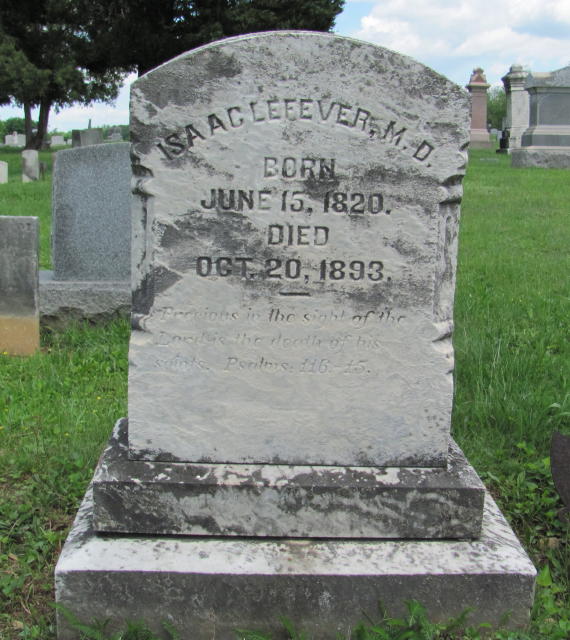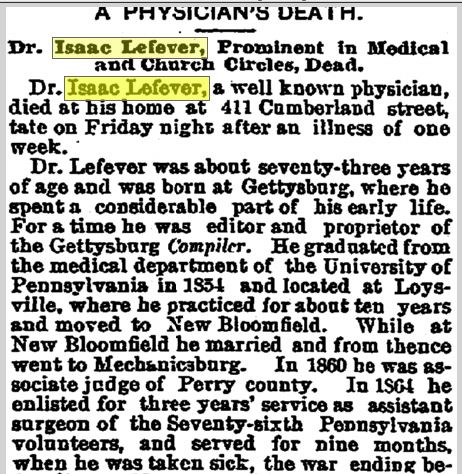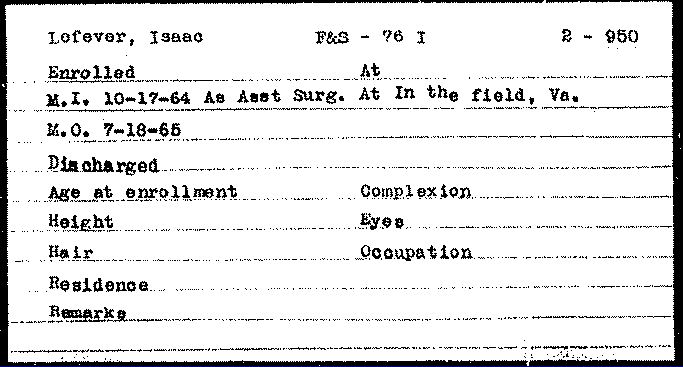Dr. Isaac LeFever – Assistant Surgeon of the 76th Pennsylvania Infantry
Posted By Norman Gasbarro on November 29, 2012

Dr. John Russel LeFever was born on 7 October 1860 in New Bloomfield, Perry County, Pennsylvania, the son of Civil War veteran, Dr. Isaac LeFever. Dr. John R.LeFever at first studied medicine under his father but eventually completed his studies at the Hahnemann Medical College of Philadelphia in 1884. Later that year, he located his medical practice at Lykens Borough, Dauphin County, Pennsylvania.
Dr. Isaac LeFever, the subject of this post, was profiled in the Commemorative Biographical Encyclopedia of Dauphin County.
John Russel LeFever, M. D., homoeopathist, Lykens, Pennsylvania, was born in New Bloomfied, Perry County, Pennsylvania, 7 October 1869. The various branches of the LeFever family found widely scattered in Pennsylvania and southward generally claim descent from Huguenot ancestors, exiled from France by religious persecution some two centuries ago. They are to be met with in York, Cuberland, Crawford and Adams Counties, Pennsylvania, about Winchester, Virginia, and in other localities, but it has become impossible to trace relationships among them. Lefevers of Crawford County and of Winchester are probably the most closely allied to the family treated of this sketch, having descended from uncles of Jacob Lefever who was Dr. John R. Lefer’s grandfather.
Jacob Lefever was born near Newville, Cumberland County, Pennsylvania, 31 May 1795. He remained at home on his father’s farm until he was about twenty, when he went into a printing office in Carlisle, Pennsylvania. Leaving Carlisle in 1818, he went to Gettysburg and there established a newspaper, which he called the Republican Compiler, and which he conducted until 1839, when Gov. Porter appointed him register and recorder of Adams County. He held the office until the Constitution made it elective. At the time of his appointment he retired from the paper, and soon after the expiration of his term of office returned to Cumberland County and engaged in farming. In the
Spring of 1848, Mr. Lefever represented Cumberland County in the State Legislature. He was still a resident of this county when he died, 26 April 1875, in his eightieth year.
Dr. Isaac Lefever was the son of Jacob Lefever and his wife Elizabeth Lefever, a native of Gettysburg, and of German descent. He was born in Gettysburg, 15 Jun 1820 and spent in that town the first twenty-five years of his life. It may be said that his education was mainly acquired through his diligent application while employed in his father’s printing office; for although he attended school regularly from the early age of five until he reached his thirteenth year, it was but a common school education, sufficient only to acquaint him with the elementary branches. When nearly thirteen he went into the printing office, worked during the day and studied at night, often rising before daylight on winter mornings to read and study in the office until breakfast time. The busy young printer even found time for Latin, reciting on winter evenings, about 1833 or 1834, to Dr. J. H. Marsden, now of York Springs, Pennsyvlania, but at that time principal of an academy for girls at Gettysburg.
After his father’s return to Cumberland County, Isaac Lefever conducted the Compiler until the Spring of 1862 when he sold the establishment, intending to remove from Gettysburg. But at this time a new impulse was given to his life, by the influence of David Gilbert, M. D., whose lectures on anatomy and physiology before the senior class of Pennsylvania College he had attended, by invitation of Dr. Gilbert, two or three years before. The Doctor now sought an interview with the young man, whose talents he had discerned, and suggested that he should study medicine. The idea was new to Mr. Lefever, but after mature consideration and consultation with friends he decided to act upon it, and accordingly commenced reading with Dr. Gilbert in the summer of the same year. He studied under his preceptor until October 1844, meanwhile attending a course of lectures on chemistry at Pennsylvania College by Prof. M. Jacobs. During the winter of 1844 and 1845, Mr. Lefever attended lectures at the medical department of Pennsylvania College in Philadelphia in which Dr. Gilbert then occupied the chair of surgery. The other professors were Drs. William R. Grant, William Darrach, H. L. Patterson, J. Wiltbank, and Washington L. Atlee. Of this group of distinguished men, Dr. Atlee is now the sole survivor. Pennsylvania Medical College, then, and for a few years after, occupied a building afterwards the seat of Hahnemann College, but the former was always allopathic in its principles.
Dr. Isaac Lefever first practiced his profession at Mount Rock, Cumberland County, Pennsylvania., for one year then moved to Loysville, in Sherman’s Valley, Perry County; in November 1855, removed to New Bloomfield, seat of Perry County. Here he joined the Perry County Medical Society, served in all its offices and held his membership until he took up homeopathy. He was also connected with State Medical Society, and among its records are several reports made by him on behalf of the Perry County Society. In 1860 Dr. Lefever was appointed Postmaster of New Bloomfield, accepting the office principally on account of some financial difficulties affecting himself and others as sureties for the previous incumbent; these difficulties being removed, his resignation was tendered and accepted, and he was relieved of office in 1861. In that year he was appointed surgeon of the Third Brigade, Fifteenth Division, Uniformed Militia of Pennsylvania, and held the commission until the then existing militia system was remodeled. In October 1862, he was elected associate judge of the courts of Perry County, and served in that office for a term of five years.
In 1862, Dr. Lefever wished to apply for an appointment in the medical department of the army, but could not obtain the consent of his wife and family to this step until 1864. The application made, after due examination, he was commissioned and ordered to report to the 76thPennsylvania Volunteers. With some little difficulty, he reached the regiment which was encamped close by the Battlefield of Chapin’s Farm, and remained with it until it was discharged. Although his commission was that of Assistant Surgeon, yet as he was the only medical officer with the regiment he performed surgeon’s duty. During a part of the time he also served in the same capacity a New York battery of artillery, besides rendering similar services occasionally to other regiments deprived of their medical officers. In July 1865, the regiment was discharged at Raleigh, North Carolina, and the Doctor returned home and resumed his practice.
Even before his graduation from Pennsylvania Medical College, which took place in March 1854, Dr. Lefever had given some consideration to the subject of homeopathy, but laboring under the misapprehension common among allopathic physicians that the system consists merely in giving very minute doses of medicine, he paid it little attention. Still with a candid desire for information, he purchased and read Hahnemann’s Orgenon, as well as the treatise of Professor Simpson of Edinburg, against homeopathy. Influenced, however, rather by the latter book, which was used in accordance with his education, he again dismissed the subject from his mind and continued allopathic practice. But now, after his return from the army, it was in some way brought again under his consideration. Meeting with a very intelligent homoeopathic physician and receiving satisfactory answers to the many inquiries which he made of this gentleman, Dr. Lefever began to experiment as well as to read carefully on the subject. Preparing some medicines he treated several cases, as he then supposed homoeopathically, but found afterwards that he had only made an approach to that practice; yet he obtained results which led to further experiment with glowing light on the subject and strengthening convictions, until, actually against his inclination, he became fully convinced of the truth of homoeopathy, and wholly disregarded allopathic drugs. The longer he is engaged in homoeopathic practice, the stronger is his conviction that it is the true method of treating diseases.
In the spring of 1869, he left New Bloomfield for Mechanicsburg, Cumberland County, from which place in November 1872, he removed to Harrisburg, Pennsylvania, where he died 29 October 1893, and his remains were interred in the cemetery at New Bloomfield, Perry County, Pennsylvania.
In the above biographical sketch, the conflict between two different medical philosophies -that of alleopathic and homeopathic medicine – needs some clarification. In 1796, Samuel Hahnemann (of Philadelphia) introduced an alternative medicine (homeopathy) which stated that the introduction of substances into the body of a sick person which would produce symptoms similar to when the same substance was introduced into a healthy person, would in effect provide a cure for the disease. According to Wikipedia: “Scientific research has found homeopathic remedies ineffective and their postulated mechanisms of action implausible. Within the medical community homeopathy is generally considered quackery.” Allopathy is a term which was coined by the homeopath, Samuel Hahnemann, to refer to other, more traditional medical practices, particularly those that used pharmacology or physical intervention to treat illness. The traditional or mainstream medical community considers “allopathy” as a perjorative and prefers other terms such as Western medicine, bio-medicine, evidence-based medicine, or modern medicine to describe its practices. See: Wikipedia.
In 1873, Dr. Isaac Lefever advertised his practice in Harrisburg as “homeopathic” (above). His son, Dr. John R. LeFever, of Lykens Borough, was a homeopathic physician as well, having received his training at Hahnemann Medical College in Philadelphia.
Dr. Isaac Lefever died on 20 October 1893. His obituary appeared in the Harrisburg Patriot, 22 October 1893:
A PHYSICIANS DEATH
Dr. Isaac Lefever, Prominent in Medical and Church Circles, Dead
Dr. Isaac Lefever, a well known physician, died at his home at 411 Cumberland Street late on Friday night after an illness o one week.
Dr. Lefever was about seventy-three years of age and was born at Gettysburg, where he spent a considerable part of his early life. For a time he was editor and proprietor of the Gettysburg Compiler. He graduate from the medical department of the University of Pennsylvania in 1854 and located at Loysville, where he practiced for about ten years and moved to New Bloomfield. While at New Bloomfield he married and from thence went to Mechanicsburg. In 1860 he was associate judge of Perry County. In 1864 he enlisted for three years service as Assistant Surgeon for the 76th Pennsylvania Volunteers [76th Pennsylvania Infantry], and served for nine months, when he was taken sick, the war ending before he could resume his service. From Mechanicsburg he came to this city in 1872 and has since devoted himself to his profession.
Dr. Lefever was an elder of the Second Reformed Church and was elected lay delegate to the Reformed Synod, which was held last week at Lebanon, but his illness prevented his attendance. He was Sunday School Superintendent for twelve years. He leaves a wife, two sons, one daughter, eight grandchildren and one great grandchild. The golden anniversary of his marriage was celebrated a short time ago. The funeral services will be held in the Second Reformed Church at Broad and Green Streets on Wednesday morning at half past seven o’clock. Rev. J. Stuart Hartman will conduct the services and the remains will then be taken to Bloomfield, Perry County, for interment.
The grave marker of Dr. LeFever, as it appears in the Bloomfield Cemetery, is pictured at the top of this post.
At this time, not much more is known about Dr. Isaac Lefever or his son Dr. John R. Lefever, the Lykens physician. Information is sought from readers – particularly stories and pictures, if available!
—————————-
The Commemorative Biographical Encyclopedia of Dauphin County is available as a free download from the Internet Archive. News clippings are from the on-line resources of the Free Library of Philadelphia. The grave marker picture is linked from Findagrave. The Pennsylvania Veterans’ File Card is from the Pennsylvania Archives.
 ;
;




This article is quite interesting. As a supplier to reenactors, and knowing many reenactors who attempt to portray a surgen, I am concern that some of the words need to be more defined.